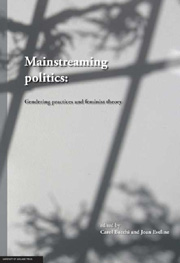Book contents
- Frontmatter
- Contents
- Preface
- Personal reflection
- Publisher's note
- List of authors and project personnel
- Acknowledgements
- Introduction
- 1 Gender/ing impact assessment: Can it be made to work?
- 2 Mainstreaming and neoliberalism: A contested relationship
- 3 Gender analysis and social change: Testing the water
- 4 What are we mainstreaming when we mainstream gender?
- 5 Approaches to gender mainstreaming: What's the problem represented to be?
- 6 Power, resistance and reflexive practice
- 7 Gender mainstreaming: The answer to the gender pay gap?
- 8 Gender analysis and community participation: The role of women's policy units
- 9 The invisibility of gendered power relations in domestic violence policy
- 10 Gender mainstreaming versus diversity mainstreaming: Methodology as emancipatory politics
- 11 University-public sector research collaboration: Mine the space, never mind the gap
- 12 Obeying organisational ‘rules of relevance’: Gender analysis of policy
- 13 Gender mainstreaming or diversity mainstreaming? The politics of ‘doing’
- Conclusion A politics of movement
- Author Index
- General Index
4 - What are we mainstreaming when we mainstream gender?
Published online by Cambridge University Press: 05 June 2012
- Frontmatter
- Contents
- Preface
- Personal reflection
- Publisher's note
- List of authors and project personnel
- Acknowledgements
- Introduction
- 1 Gender/ing impact assessment: Can it be made to work?
- 2 Mainstreaming and neoliberalism: A contested relationship
- 3 Gender analysis and social change: Testing the water
- 4 What are we mainstreaming when we mainstream gender?
- 5 Approaches to gender mainstreaming: What's the problem represented to be?
- 6 Power, resistance and reflexive practice
- 7 Gender mainstreaming: The answer to the gender pay gap?
- 8 Gender analysis and community participation: The role of women's policy units
- 9 The invisibility of gendered power relations in domestic violence policy
- 10 Gender mainstreaming versus diversity mainstreaming: Methodology as emancipatory politics
- 11 University-public sector research collaboration: Mine the space, never mind the gap
- 12 Obeying organisational ‘rules of relevance’: Gender analysis of policy
- 13 Gender mainstreaming or diversity mainstreaming? The politics of ‘doing’
- Conclusion A politics of movement
- Author Index
- General Index
Summary
Introduction: Carol Bacchi and Joan Eveline
This chapter explores the proposition that how gender is conceptualised has implications for the efficacy of gender mainstreaming and gender analysis as change processes. It makes the case that gender is a contested concept, that it can be defined in ways that reproduce male, white, able-bodied privilege, or in other ways that reduce certain inequalities. In particular it develops in some depth our suggestion that both gender analysis and gender mainstreaming be conceptualised as always incomplete, thus ‘unfinished business’, rather than as fixed categories of analysis. The goal here is to shift attention from the idea that we may ‘have’ either a gender or a gender mainstreaming policy/program to the continual effort involved in fixing or ‘doing’ the gendered subject or in giving ‘content’ (meaning) to gender mainstreaming.
The chapter begins with a brief history of ‘gender’ as a political concept within feminist theory. It explains how the theorising of masculinities and the growing attention to differences among women put the utility of the concept in dispute, and how the 1970s idea of a sex/gender distinction was found wanting. We make the case that part of the problem with the category ‘gender’ is the common way in which it is conceptualised as a part of a person rather than as a process that is ongoing, contested and incomplete. Thinking about gender as a verb, or as a gerund (gendering), we suggest, is more likely to capture how gender differentiation is continually ‘done’ through discursively-mediated institutional and organisational processes, including policymaking.
- Type
- Chapter
- Information
- Mainstreaming PoliticsGendering Practices and Feminist Theory, pp. 87 - 110Publisher: The University of Adelaide PressPrint publication year: 2010
- 1
- Cited by



